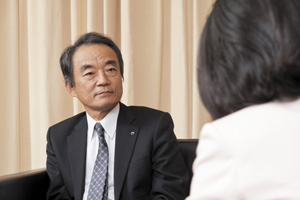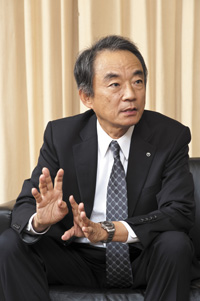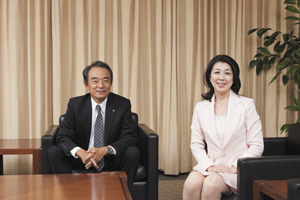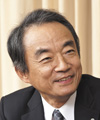Addressing problems now—not
later—to gain a new perspective
––Mr. Katayama, it appears that your duties have expanded significantly since you became vice president. Please tell us about your aspirations as a person holding enormous responsibility.
I am actually in charge of two major areas. The first is the entire network, which I originally became involved with as director of the Technology Planning Department. I will continue in this role as we move forward.
The other area is research and development (R&D), which is, of course, very broad. For example, just in terms of technology, there are fields that I have never been involved in or had any experience in, so learning about fields I know very little about is very interesting and productive. When visiting NTT’s laboratories, I have had the opportunity to attend half-day lectures given by managers and researchers. I can’t say that I’ve always come away having a clear-cut understanding of the content covered, but that is exactly why I find new technology so interesting. As the person in charge, hearing about these new fields keeps me sharply aware of the scale of work that I must keep my eye on.
In addition, time allocation has become more important for me since taking on the duties of vice president. For example, as I meet more and more people with all sorts of viewpoints, I want to absorb as much as possible at every encounter. Regardless of how basic a matter may seem, I make it a point to ask questions without hesitation on any unclear points and to understand the situation there and then. In such a limited time, my aim is to acquire new knowledge and insights without leaving any unanswered questions.
2013: Towards the Next Stage
––As the New Year begins, what can you tell us about 2013?
NTT’s Medium-term Management Strategy announced in November last year was given the title Towards the Next Stage.
Our business domains are fixed communications, mobile communications, and cloud services. These three large domains are undergoing various changes that differ for each domain.
This new strategy points out that dealing with these changes on the basis of present-stage policies has not provided NTT with a path to future growth. It also states that these last few years have been a period of transition, and that NTT is now set to move on to the next stage.
But what specifically must we do to move on to the next stage? Up to now, our relationship with our customers has been one of a service provider in our capacity as a telecommunications carrier. From here on, however, we would like to give more attention to whether the services we provide are truly useful and appropriate for our customers.
We also need to keep in mind that those who we would like to see using our services are not just individuals but corporate entities too. We therefore need to provide services that, of course, connect the customer and NTT, but that also connect the customer with its customers and that even provide a platform for service-to-service connections. In this way, I look to grow the NTT Group by becoming that necessary partner to a company that is expanding its business.

From a provider to a value partner
––What is NTT’s specific strategy for making these changes?
First and foremost, the customer must see value in choosing NTT as a partner. Needless to say, cloud and big-data technologies are going to have a big impact on society. And I believe that the smartphone gives users the feeling of being able to do something that they could not do in the past. At present, we are moving into a stage of trying to figure out how we can use such technologies and tools in an organic, systematic way.
NTT is promoting this trend making best use of its extensive experience and the know-how it has accumulated over many years. At the same time, NTT Group companies are pursuing how best to approach the creation of new networks and services. I would like to leverage this forward-looking mindset to become the company that customers seek out as a partner and to drive the change from being a provider to a value partner.
To give you an example of specific actions in this regard, we are working to enhance our R&D efforts by setting up R&D bases in North America, where much information and R&D in relation to communications technologies are concentrated, and by building open relationships with others in this field.
In trying to produce things that could not be given form in the past or to simply create new and novel things, problems surrounding a particular R&D location can have a serious impact on results.
In North America, companies that are performing cutting-edge tests are concentrated in areas such as Silicon Valley. Since problems related to cultures and regulations can hamper the R&D process, a location that provides researchers with creative stimuli gives them the freedom to pursue the next stage as they see fit.
I myself am endeavoring to set up more channels of communication with people both inside and outside the company and inside and outside Japan. If it initially seems that no relationship is forthcoming, I have found that looking at the situation from a different angle will give me a valuable hint about how to proceed. For this reason, I think it is important that I place myself amidst the chaos and associate with as many people as possible.
Incidentally, some companies that we have acquired through mergers and acquisitions have bases in North America, and I would like to make the best use of those bases in establishing productive relationships.

Separating playful exploration and waste in R&D
––What expectations do you have of R&D?
I would like to bring together the R&D efforts of the NTT Group to provide useful services that can have a true impact on society. Just last year we introduced new and compelling services such as Shabette Concier, a voice-agent application, and we also began to set up an infrastructure involving the network, smartphones, and other elements to further enhance our service lineup. I would like to point out that these new services that we are providing may not necessarily be the final, fixed form, but if we don’t put them on the market now, we will never be able to understand our customers’ response to them. With a view to receiving input from others in developing and enhancing services, I would at times like to actively pursue open innovation to make good use of wisdom from the outside.
Additionally, I truly feel that a new type of development cycle is appearing within R&D at NTT. In this cycle, someone takes an idea that someone else has talked about in passing and launches a service based on that idea even if it’s still incomplete. Then, while the service is being monitored, further research is conducted to enhance it. I would like to promote further use of this effective cycle.
However, it seems that people aren’t yet able to fully utilize smartphones and other advanced mobile devices. I would like to see NTT create a society in which these devices can be used in a stress-free manner through a variety of services.
We should also help to create a society that enables the elderly and physically challenged to use services without worry. This, I believe, is the mission of any company involved in the information and communications technology (ICT) industry.
For example, we are researching ways of moving a wheelchair using brain waves and detecting danger by means of a camera mounted in a person’s eyeglasses. The idea here is to create conditions in which a person can easily receive a desired service by simply thinking about it.
At one time, futuristic services such as a translating telephone were things that you would see only in movies. But today, such services are entering a practical stage. The Shabette Concier phone app that I mentioned will return a spoken reply when asked a question. Services like these were just a fantasy only a few years ago, but they are now becoming a reality. Looking forward, I would like to open up even more possibilities in communication services. I believe that there is much that can be done with the R&D expertise of the NTT Group.
Of course, it goes without saying that providing the network with full support is important given the huge impact that the smartphone is having on society. Moreover, as it can no longer be said that doubling traffic doubles revenues as in the past, we must make an effort to lower network costs. For example, we are continuously researching and developing ways of increasing the capacity of a single optical fiber.
I can say that this year will be a time of many and varied trials that will help to give direction to such R&D efforts. In some cases, they will provide a basis for continuing or terminating certain R&D projects. In this regard, it is also necessary to check carefully for any duplication in R&D caused by a lack of communication between researchers and to eliminate waste when found. In particular, we have established a global R&D committee to steer R&D in North America and to investigate the presence of any waste in our globalization efforts.
However, there is a fine line between playful exploration and waste in research. Basically, I would like to see researchers include a playful spirit in their work and to be open to unexpected discoveries within the research objective given to them. Either an individual or an organization can adopt this approach. Within the larger research theme, however, I would ask each researcher to remember the role that he or she is being asked to carry out.
While an open mind and the free testing of ideas are essential to basic research, duplication in R&D that has a set direction can possibly lead to waste. I’d like to keep a close eye on that to prevent this kind of waste.
––Could you tell us something about NTT’s energy strategy?
In terms of our Green ICT activities, the planned power outages and power-saving measures that followed the Great East Japan Earthquake placed us in a very severe environment. Of course, telecommunications is an industry in which nothing can be done without energy, so it is imperative that we adopt power-saving measures on our own and reduce our energy consumption to fulfill our company mission. I am taking up the challenge of deploying telecommunications equipment and air conditioning systems with good energy efficiency and would like to propose energy-saving mechanisms that can be used outside the NTT Group by society as a whole. We are entering an era in which solar power generators will be installed in every home and school and elsewhere to provide energy for individual use as well as to provide surplus energy for sale. If the use of electric cars continues to expand, the places that produce energy and use energy will ultimately cover a wider range than ever before. Here, ICT is the best way of controlling this energy infrastructure in real time, and I would like to demonstrate technology for that purpose.
A year of trials: thinking while running
––Mr. Katayama, could you leave us with a few words for all employees of the NTT Group?
It is vitally important that we face the future with a sense of urgency. NTT DOCOMO promotes a “70% is OK at first” mindset to emphasize the importance of speed in R&D, and more and more NTT Group companies are establishing systems that recognize the need for speed and an approach that pursues R&D while on the run. I plan to promote the adoption of such a system throughout the NTT Group. Of course, this assumes that any such system will have to be refined to obtain a 100% adoption rate.
I would also like to see NTT Group employees communicate better with each other by clearly recognizing their own value while respecting the value of others. In the end, it is individuals that carry the NTT signboard on their back.
Additionally, when faced with a major problem in your work, keep cool and don’t despair—seek the advice of those around you to overcome the problem. Talking to lots of people at such a time will help you stop for a moment and assess the situation before making a decision. It might be especially helpful here if you listen to people who have been down the same road before and had the same worries.
The NTT Group is off to a good start in making the transition to the next stage. Please keep in mind what it is that you want to accomplish in that stage and what it is that you should do to achieve that. Let’s combine the abilities and talents of everyone in the NTT Group to form an even greater force in moving forward.


